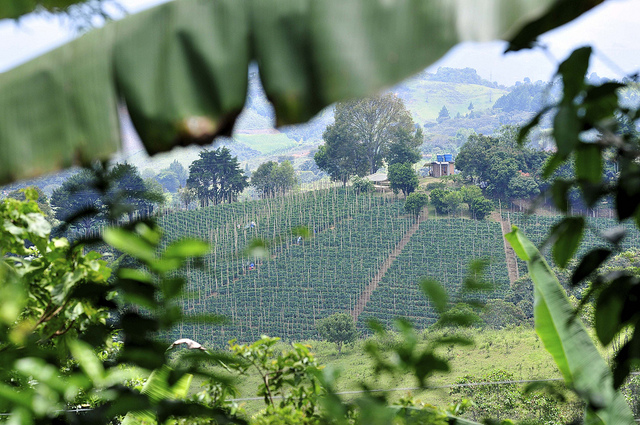When it comes to enacting climate change policy in agriculture, policymakers are often challenged by a range of information and input from different sectors: the research community, the private sector, and the public and policymaking community. What’s more, their policies must account for a range of global forces, from price changes to pressures on land use. To successfully develop and implement policies that mitigate climate change and enhance food security, they need reliable and relevant data that incorporates input from a range of disciplines and sectors.
A recent workshop in Bogota, Colombia highlighted how one climate change research project is encouraging this crucial collaboration. At the “Low Emission Development Strategies (LEDS) Preliminary results for Colombia” workshop, researchers from IFPRI and its sister research organization, the International Center for Tropical Agriculture (CIAT), invited colleagues from the policymaking and private sectors to spur dialogue about climate change policy recommendations.
The project, part of a larger initiative called [Enhancing Capacity for Low Emission Development Strategies (EC-LEDS), supports sustainable and climate-resilient economic growth that is compatible with a reduction in greenhouse gas emissions. Relying heavily on local partnership and intersectoral collaboration, the project allows for customization of research results to suit individual policymaker needs while accounting for broader socioeconomic and trade scenarios. “Land use policy encompasses various sectors, and this project allows people from different disciplines and sectors to talk and discuss possible options,” said Alex De Pinto, Senior Research Fellow at IFPRI, and the project’s lead researcher.
“Policymakers do care about the consequences of climate change mitigation policy on other policy priorities,” said De Pinto. “Food security is now one of the most sensitive policy issues in every country. In Colombia, agriculture is crucial for food security and economic growth. However, one implication of increasing production can be high rates of deforestation, causing conspicuous effects on carbon stocks. Policymakers need reliable approaches, based on evidence, to estimate the consequences of global price changes and climate change related policy targets.”
At the workshop, researchers from IFPRI and CIAT demonstrated a modelling framework that provides information and support to Colombian policymakers as they work to develop land use policies in response to climate change. The framework uses a series of modelling tools—including an agricultural sector partial equilibrium model, IFPRI’s IMPACT model, a land use model, and a crop model—to determine changes in emissions and carbon stocks in forest land, cropland, pasture and other land uses, as well as future economic impacts, under various policy scenarios.
Attendees, including researchers and representatives of both the private sector and several Colombian government ministries, enthusiastically discussed how this modelling approach could be customized to suit the conditions faced by Colombian policymakers and brainstormed on ways to further increase intersectorial collaboration.
At the end of the day, the workshop attendees agreed to continue the useful collaboration already underway with the LEDS project. Representatives from the various ministries and researchers plan to work together to develop other models and simulation scenarios that are tailor-made for Colombia. This allows the project to reflect the unique factors and story of the country’s development in its modelling framework, and helps users prioritize policy scenario simulations.
After all, as De Pinto pointed out, “Each ministry may see climate change policy from their own priorities and goals, but they are all important and all inter-connected.”
Low Emission Development Strategies (LEDS), is a project led by IFPRI as a part of Enhancing Capacity for Low Emission Development Strategies (EC-LEDS) and financed by the US Agency for International Development (USAID).
Related Materials







